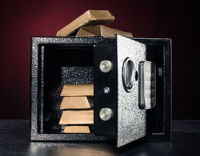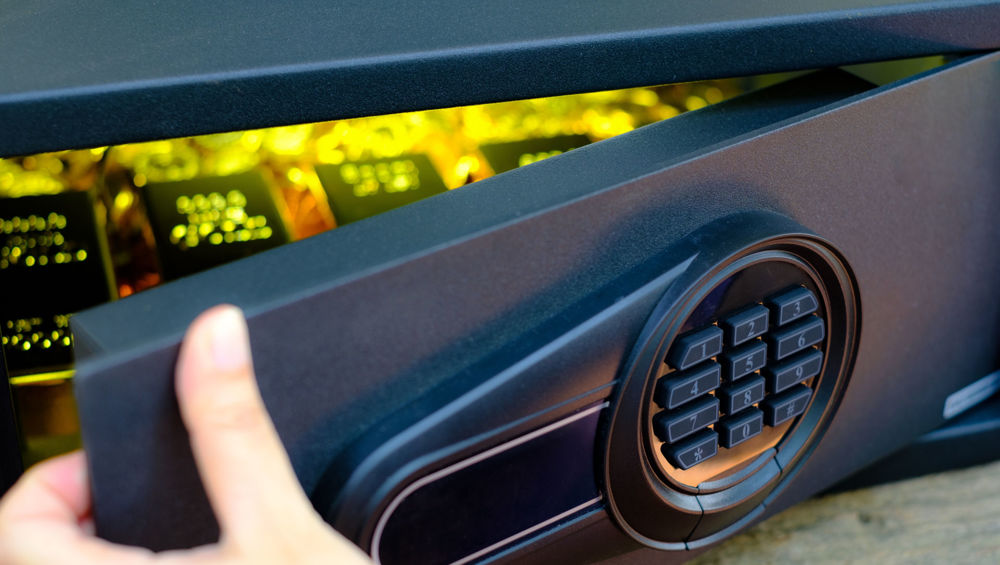Posted on March 26, 2022

Gold bullion has long served as a physical store of value and a hedge against inflation. One of gold bullion’s unique qualities is that it is a tangible investment. While many investors appreciate the fact that gold bullion is an investment they can hold in their hands, some individuals neglect the importance of properly storing their gold.
Here, we’ll discuss various options and considerations you should consider when deciding on your gold bullion storage solution.
The key to storing your gold bullion safely is to protect your investment from the possibility of any type of loss. Keeping your gold under lock and key is a great first step, but it is also imperative to protect your gold from being damaged or misplaced.
 What are my options for gold storage?
What are my options for gold storage?Investors have a couple of options for gold storage, each with its own benefits and drawbacks. Gold bullion owners can store their gold in:
We don’t recommend hiding your gold under your mattress or floorboards or burying it in a “secret” location. These options run the risk of your heirs never discovering your gold if something happens to you. Consider how many times you’ve seen stories with headlines like Home Renovation Yields Rare Gold Coin Treasure. Hiding your gold bullion is a really risky way to gift it to a stranger in the future rather than your chosen beneficiaries.
People who choose a home safe for their gold probably value privacy, prefer being in complete control of their investment, lack trust in banks, or simply want 24/7 unfettered access. A home safe is the only way to keep your gold close to hand and to avoid dependence on an intermediary.
Some gold owners keep a portion of their bullion in a home safe and select another storage method for the rest. At the very least, diversifying your bullion storage means you aren’t a single burglary away from being a former gold owner.
A safe deposit box at a bank is an easy option that offers bank security (which, let’s admit, is better than just about everyone’s home security!) at an affordable price. As a bullion storage solution, safe deposit boxes are best for those who may not need as much privacy, do not plan on storing a large quantity of gold, and have plans to buy their own insurance coverage.
That last point is important! As The New York Times informs us, there aren’t any federal laws about bank safe deposit boxes – so there’s no FDIC to pay you back if the bank is robbed or (worse) goes bankrupt.
A depository is a highly-secured third-party facility that stores precious metals on behalf of others. Precious metals depositories are the one-stop shop for bullion investors who value the best security, comprehensive insurance, and a storage solution designed specifically for bullion. A depository is an excellent choice for long-term storage, particularly for investors with a large amount of bullion. You will have two main options at a precious metals depository: allocated and unallocated gold storage.
Unallocated storage has lower ongoing costs, but your gold is intermingled with other people’s gold bullion. If you deposit 10 one-ounce gold bars, they will be mixed in with other gold bars in the vault. And when you go to withdraw them later, you likely will not receive the exact bars you deposited. This may or may not be of concern to you.
On the other hand, allocated gold bullion storage is not intermingled. Your specific gold is stored separately, in its own location, just like in a safe deposit box at the bank – but with better security. You can deposit your gold and receive your gold back when you withdraw it.
For anyone concerned with preserving the quality of their bullion with the highest security and best insurance, a depository is also the most dependable solution. Depository staff are very familiar with chain-of-custody and triple-checking their records. Depositories are usually very heavily insured against loss or damage as well.
Again, it might make sense for you to store your gold bullion in more than one place. You might choose to keep some at home, some at the bank, and some at a depository. Each additional storage option does increase your costs, though you should consider whether the additional peace-of-mind you have compensates sufficiently for those costs. You don’t want to be the person who stores all their gold bullion in a home safe and is then too worried about robbers to leave the house.
High purity (22k) and pure gold (24k) does not tarnish – that’s a major reason it’s been a valued asset throughout recorded human history. However, lower purity levels such as 18k can tarnish (not the gold itself, but the metals alloyed with the gold). Since modern gold bullion is almost always 24k/0.999+ pure (or 22k in the case of gold American eagles and gold Krugerrands), this isn’t much of a concern.
With that said, if you own gold jewelry of 18k or less and store it with your gold bullion, the tarnish could transfer, even though it is very unlikely.
What you really need to worry about is storing gold bullion together with silver bullion. Silver tarnishes easily, and that oxidation can transfer to gold. So, store your gold and silver in separate areas to be safe.
Yes! You should keep gold bullion in its original packaging. The mints that produce bullion provide high-quality packaging that offers protection, as well as tamper-proof plastic seals. This is even more important if your gold comes with an in-package assay from the refiner or mint.
 Gold bullion should be kept in containers made for the particular product they protect. Containers that store gold should be airtight to prevent moisture buildup or anything else that can potentially damage bullion. Even though gold won’t tarnish or rust, that’s no excuse to ignore moisture – at the very least, the documents and receipts you store with your bullion will suffer. (You did keep your receipts and documentation, didn’t you?)
Gold bullion should be kept in containers made for the particular product they protect. Containers that store gold should be airtight to prevent moisture buildup or anything else that can potentially damage bullion. Even though gold won’t tarnish or rust, that’s no excuse to ignore moisture – at the very least, the documents and receipts you store with your bullion will suffer. (You did keep your receipts and documentation, didn’t you?)
A round capsule or container is ideal for keeping gold coins or medallions safe. In addition to being kept in their original packaging, gold bars should be stored in rectangular containers made to hold bullion bars. You can store larger quantities of bullion coins in packaging tubes that come straight from the issuing mint, although note that pure gold coins like gold buffalos and Canadian maple leafs are notoriously easy to scuff, even when they’re in a storage tube.
Besides the aforementioned, there are some other considerations investors should take into account when thinking about gold bullion storage. For example, moving substantial amounts of gold bullion can incur pricey shipping costs, which can quickly eat into your savings. Since gold is primarily an investment, you should keep shipping costs down and avoid unnecessarily moving gold in and out of storage (unless you’re transporting it yourself).
To help manage unforeseen risks, every gold bullion investor should have their gold insured, whether bullion-specific insurance, coverage under a homeowner’s insurance policy, or included in the fees a precious metals depository charges. If you’re counting on a homeowner’s insurance policy, document your bullion (pictures and receipts, ideally, for every single item).